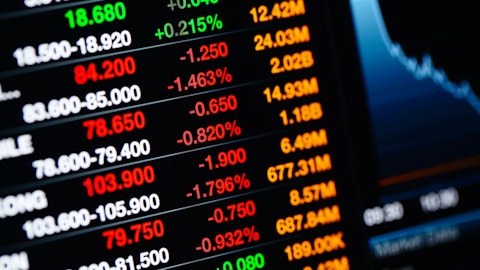Cryptocurrencies have gained a lot of popularity in the last couple of years, with some such as Bitcoin, Ethereum, Ripple, gaining a lot of ground and hundreds of new cryptocurrencies being issued. Overall, there are currently over 1,400 cryptocurrencies, which have a total market cap of over $590.03 billion. The largest cryptocurrency is Bitcoin, which has an aggregate value of $197.93 billion, followed by Ethereum, which is valued at $104.11 billion.
The ascension of cryptocurrencies has created a whole industry around them, with many branches devoted to serving cryptocurrencies. Exchanges are used to buy and sell cryptocurrencies; hardware manufacturers have developed mining rigs that can be used to mine tokens. There also are cryptocurrency wallets, both physical and digital, merchants that deal only with cryptocurrencies.
One aspect of cryptocurrency boom that is particularly interesting is the blockchain technology. Blockchain, or distributed ledger, is what all cryptocurrencies are based on, but its utility goes way beyond cryptocurrencies, with potential applications in other areas such as logistics, financial, real estate, farming, and even government. Because of its many applications, the blockchain technology has led to a boom in new startups and projects often backed by large corporations. International Business Machines Corp. (NYSE:IBM) is working on a couple of projects involving blockchain-based platforms for financial transactions, as well as a logistics joint venture with Maersk that would use blockchain technology for global trade. Microsoft Corporation (NASDAQ:MSFT) and Amazon.com, Inc. (NASDAQ:AMZN) have started offering Blockchain-as-a-Service on their cloud platforms that allows companies to develop and test blockchain applications without the need to invest in new infrastructure.
However, what’s more important is that blockchain technology has paved an easier path for startups to launch their products and fund them without resorting to venture capital or IPOs. Startups that intend to launch a blockchain-based product can now launch them via Initial Coin Offerings, where they usually sell tokens that can be either sold later or used to pay for services associated with their platforms. 2017 saw an explosion in ICOs, with over 700 projects raising nearly $5 billion. An ICO involves the sale of tokens that are similar to cryptocurrencies and which can be floated on cryptocurrency exchanges, where the powers of supply and demand determine their value based on the performance of the underlying product. In some cases, such as Ethereum and Ripple, these tokens gain a lot of value. Ethereum’s token, Ether, saw its value soar as many large companies, including Microsoft Corporation (NASDAQ:MSFT) and Intel Corporation (NASDAQ:INTC) became interested in the platform and possible applications in the corporate world, while Ripple’s XRP gained ground following partnerships with several big banks, Including UBS Group AG (USA) (NYSE:UBS), UniCredit and Santander, and, more recently, Moneygram International Inc (NASDAQ:MGI).
Here, we feel it’s important to make a distinction. While coins and blockchain tokens share many similarities, and are all called cryptocurrencies, they also have many differences. Coins such as Bitcoin and Litecoin represent alternatives to currencies, their value is determined by their scarcity and utility, which is derived from its popularity among consumers and merchants, among other things. Bitcoin and altcoins (the collective name given to coins other than Bitcoin) are more similar to gold in the way that they are used to store value, rather than fiat money, which are usually backed by the faith and credit of the government that issues it. On the other hand, tokens represent a particular asset or utility that is usually built on top of another blockchain. Tokens are easier to create as they are built using a template on an existing platform, such as Ethereum and their value is derived either as part of the project’s future revenue or is based on its usage within its ecosystem. In this way, the more popular the project is, the higher is the value of the token. In this way, one might argue that tokens represent a better investment than coins, since their value is based on a project, whose potential can be analyzed, and which exploits the potential of blockchain beyond the simple bookkeeping function.
Nevertheless, both tokens and coins are trading together on cryptocurrency exchanges. These exchanges serve as bridges between fiat and cryptocurrency segments, allowing people to buy and sell cryptocurrencies for fiat money and exchange them into other cryptocurrencies. There are several major cryptocurrency exchanges, such as Coindex, CEX.IO, Kraken and others. Because cryptocurrency exchanges service the whole industry, they are not dependent on individual cryptocurrencies’ performance, which puts them among the ultimate winners from the cryptocurrency boom.
The rapid growth registered among cryptocurrencies created a new avenue for a lot of companies to raise capital. Thousands of enterprises have conducted their ICOs, raising billions of dollars from investors. And while blockchain technology that most of these projects are based on is highly useful and reliable, the potential and utility of many projects that have been is questionable at least. Therefore, investors that are looking for new investment opportunities must conduct due diligence, which can be difficult given that the technology is still new. A less risky way to invest in the cryptocurrency market is to purchase tokens of companies that are already operational and have some results to show to potential investors. One company that is currently offering tokens under a crowdsale is EXMO.
EXMO is a cryptocurrency exchange that has been operational for over five years. During this period, the platform grew to over 1.0 million users, 46 active currency trading pairs, including 18 unique currencies and is one of the leading exchanges in Europe with a monthly trading volume of around 160,000 Bitcoins. In this way, its crowdsale offers investors the opportunity to invest in an already active business that has shown some results and the company guarantees the EXO token buyout. In addition to offering margin loans, EXMO intends to acquire other exchanges in order to expand its scalability and offer margin trading on other platforms.

One of EXMO’s advisers is Desmond Marshall, the founder of Rouge Ventures, an investment and strategic consulting firm in Asia. Mr. Marshall is also one of the first individuals in the region that joined the Enterprise Ethereum Alliance, a non-profit organization that was founded by over 200 large corporations, including Microsoft Corporation (NASDAQ:MSFT), Intel Corporation (NASDAQ:INTC) JPMorgan Chase & Co. (NYSE:JPM), universities and governments, which aims to develop applications for Ethereum blockchain.
In an interview, Mr. Marshall discussed the phenomenon on ICOs and crowdsales, emphasizing that while these ways of capital raising have attracted a big crowd, investors are becoming savvier and are looking for companies that have a solid business performance. While choosing an ICO to invest in, Mr. Marshall focuses on business operations, customers numbers and profits, as well as the time that the company has already been operational, which can be reassuring that the project is not going to flop after the ICO.
When it comes to EXMO, Mr. Marshall, who also has his own ICO ranking, believes that the crowdsale is a logical step for the company, given that it is a well-known and established exchange and has enough services to justify the launch of its own token. Moreover, the demand for cryptocurrency exchanges is still strong as more people are looking to trade cryptocurrencies and technologies for professional traders, such as algorithmic trading, are being introduced, as well, which creates the need for more complex platforms. Moreover, Mr. Marshall also thinks that margin trading is a good move for the company, since it will increase its customer base and add more professional investors that will be trading in higher volumes and more types of tokens.
Overall, EXMO plans to raise $300 million through the crowdsale, 50% of which it plans to allocate towards margin loans, 5% towards an insurance fund and 45% to its growth through acquisitions. These plans should allow EXMO to expand its userbase even more and attract new investors that would trade cryptocurrencies in higher volumes. Therefore, the EXMO crowdsale, which will be held between April 26 and May 26, 2018 represents an interesting investing opportunity since the company plans to address an obvious need in the market and the tokens are backed by potential dividends.
Disclosure: The opinions expressed in this article are Insider Monkey’s writer, Alex Oleinic’s. Mr. Oleinic doesn’t have positions in Microsoft Corporation (NASDAQ:MSFT), Intel Corporation (NASDAQ:INTC), JPMorgan Chase & Co. (NYSE:JPM), UBS Group AG (USA) (NYSE:UBS), Moneygram International Inc (NASDAQ:MGI), International Business Machines Corp. (NYSE:IBM) and Amazon.com, Inc. (NASDAQ:AMZN). Insider Monkey received compеnsation in exchange for publishing this article. Insider Monkey doesn’t recommend purchase/sale of any securities, cryptocurrencies, or ICOs. Please get in touch with a financial professional before making any financial decisions. You understand that Insider Monkey doesn’t accept any responsibility and you will be using the information presented here at your own risk. You acknowledge that this disclaimer is a simplified version of our Terms of Use, and by accessing or using our site, you agree to be bound by all of its terms and conditions. If at any time you find these terms and conditions unacceptable, you must immediately leave the Site and cease all use of the Site.





